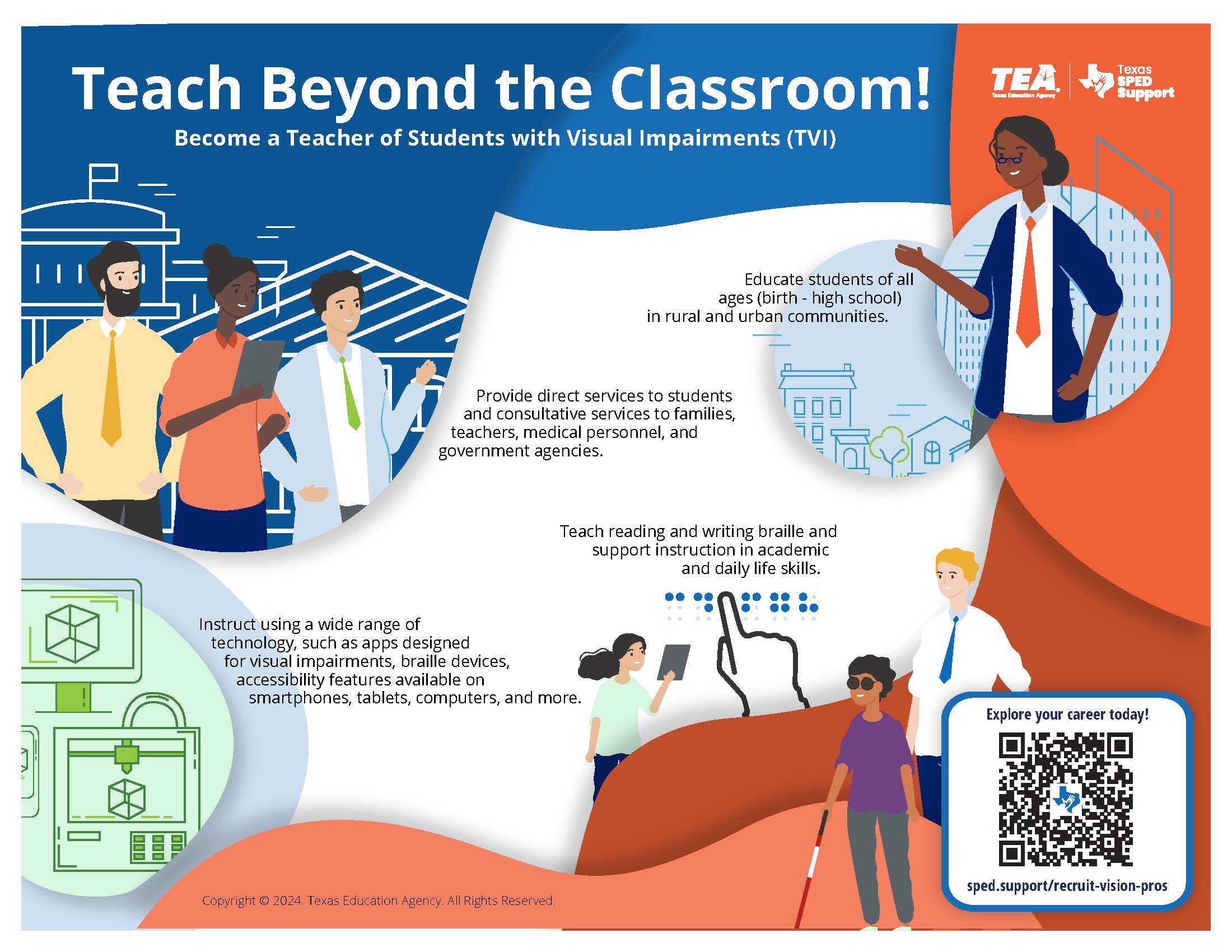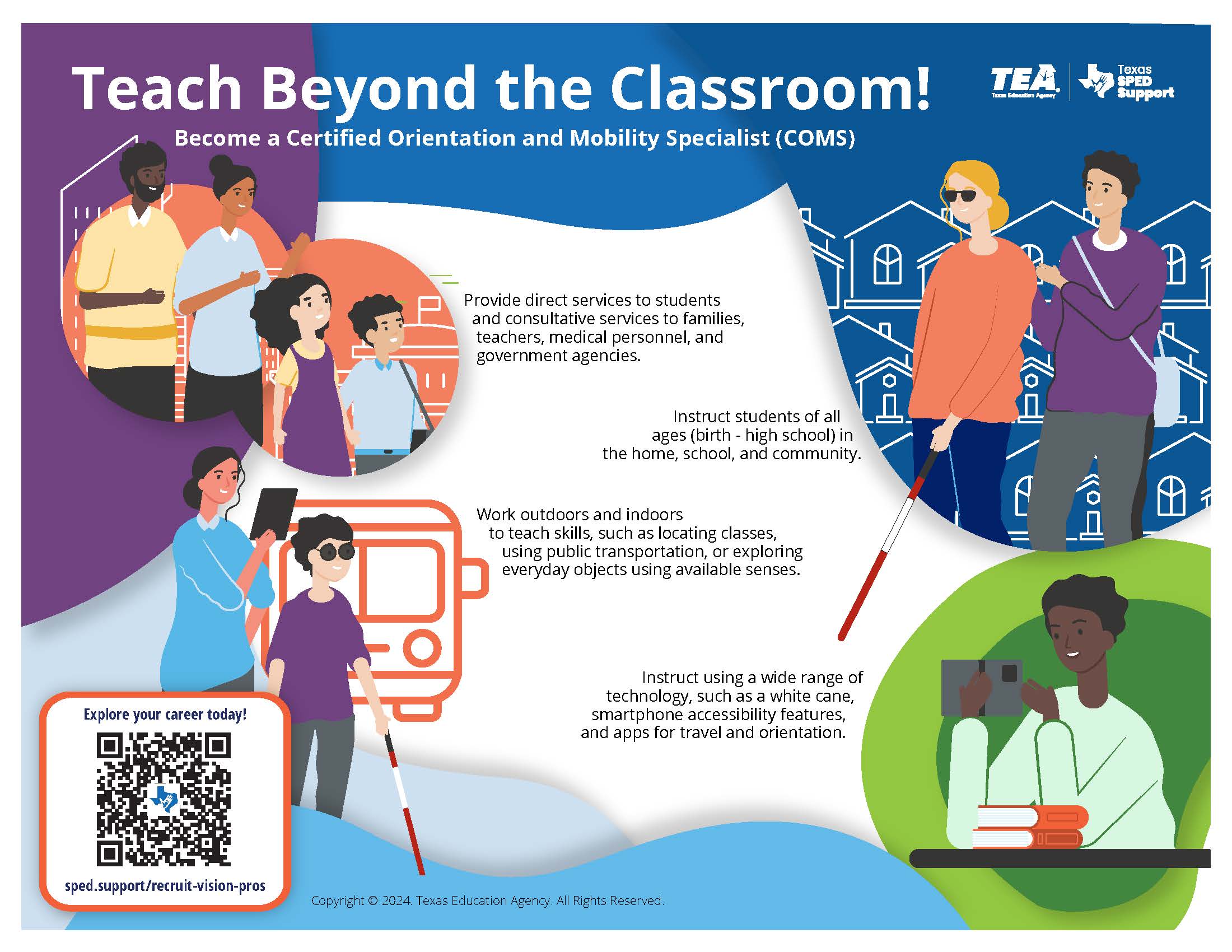Recruitment of Vision Professionals

Teacher of Students with Visual Impairments (TVI)
- Educate students of all ages (birth - high school) in rural and urban communities.
- Provide direct services to students and consultative services to families, teachers, medical personnel, and government agencies.
- Teach reading and writing braille and support instruction in academic and daily life skills.
- Instruct using a wide range of technology, such as apps designed for visual impairments, braille devices, accessibility features available on smartphones, tablets, computers, and more.

Academic Requirements
Teacher of Students with Visual Impairments (TVI):
- Bachelor’s Degree from an accredited university
- Initial teaching certification in elementary or secondary general or special education; elementary or secondary education (special education preferred, not required)
Financial Incentives
Both SFASU and TTU offer a service grant. Each university distributes funds according to its program guidelines, and it is a competitive process. For additional information contact advisors at the university of your choice.
Contacts
General information about becoming a TVI in Texas:
Contact: Texas School for the Blind and Visually Impaired (TSBVI)
Email: outreach-certifcations@tsbvi.edu
TSBVI Professional Preparation Website
Stephen F. Austin State University
Program Contact: Heather Munro
Email: omvi@sfasu.edu
SFASU TVI Website
Stephen F. Austin State University
TVI Program Contact: Rona Pogrund
Email: pogrund@ttu.edu
TTU Sowell Center Website
Certified Orientation and Mobility Specialist (COMS)
- Provide direct services to students and consultative services to families, teachers, medical personnel, and government agencies.
- Instruct students of all ages (birth - high school) in the home, school, and community.
- Work outdoors and indoors to teach skills, such as locating classes, using public transportation, or exploring everyday objects using available senses.
- Instruct using a wide range of technology, such as a white cane, smartphone accessibility features, and apps for travel and orientation.

Academic Requirements
Academic Requirements for a Certified Orientation and Mobility Specialist (COMS):
- Bachelor’s (SFASU only) or Master’s Degree (SFASU & TTU) or
- Graduate certificate (SFASU & TTU), and
- Practicum
- Internship
- Pass the Academy for Certification of Vision Rehabilitation & Education Professionals (ACVREP) exam
Financial Incentives
Both SFASU and TTU offer a service grant. Each university distributes funds according to its program guidelines, and it is a competitive process. For additional information contact advisors at the university of your choice.
Contacts
General information about becoming a COMS in Texas
Contact: Texas School for the Blind and Visually Impaired (TSBVI)
Email: outreach-certifcations@tsbvi.edu
TSBVI Professional Preparation Website
Stephen F. Austin State University
Program Contact: Heather Munro
Email: omvi@sfasu.edu
SFASU TVI Website
Stephen F. Austin State University
Orientation & Mobility Program Contact: Nora Griffin-Shirley
Email: N.Griffin-Shirley@ttu.edu
TTU Sowell Center Website
Video Testimonials
Chelsea Schumacher
Chelsea Schumacher's Personal Story on Becoming a Certified Orientation & Mobility Specialist Chelsea Schumacher is a Certified Orientation and Mobility Specialist (COMS). She started her career in the corporate world, but soon realized she wanted to work with students with visual impairments after attending the National Goalball Tournament.
Stephan Slawson
Stephan Slawson's Personal Story on Becoming a Vision Professional Stephan Slawson is both a teacher of students with visual impairments (TVI) and a certified orientation and mobility specialist (COMS) in south Texas. Learn more about how Stephan was inspired to become a vision professional.
Sarah Williamson
Sarah Williamson's Personal Story on Becoming a Teacher of Students with Visual Impairments Sarah Williamson shares how she became a teacher of students with visual impairments (TVI). She began her teaching career working with students with complex medical needs in the classroom and student's home. When she had a student with a visual impairment in her classroom, she began collaborating with the TVI to meet the student's educational needs. After this experience, Sarah was hooked and became a TVI!
